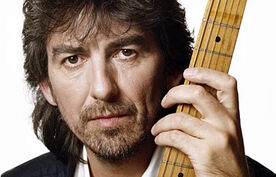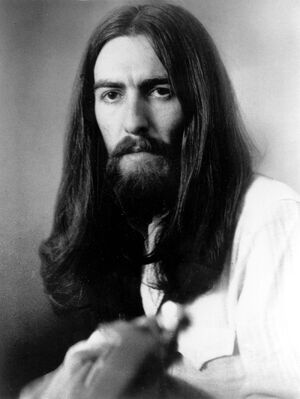| George Harrison | |
| Born | February 25, 1943 |
| Died | November 29, 2001 |
| Occupation | Musician, philanthropist, author, producer, gardener |
George Harrison (February 25, 1943 – November 29, 2001) was a founding member of The Beatles. Harrison also had an award-winning solo career and was also a part of the Traveling Wilburys supergroup. While known as "the quiet Beatle," George still has legions of fans to this day. George was the youngest of the Beatles.
Biography
Early life
George was born to Louise Harrison and Harold Harrison in Liverpool, England on February 25, 1943 (although it was later discovered that he was actually born just before midnight on February 24th)
During his childhood, George attended the Liverpool Institute for Boys, where he met future band mate, Paul McCartney. George was considered a bad student in grammar school, but he enjoyed playing the guitar. He and his brother formed a short-lived group called the Rebels. The Bass player for the Rebels was Alan Williams.
The Quarrymen
Harrison was introduced to the band called The Quarrymen by Paul McCartney, his friend from school. By early 1958, George was playing lead guitar in the band. He was the youngest member of the band, which was led by John Lennon. In 1959, George left school and worked as an apprentice electrician.
The Beatles
In 1960, The Quarrymen changed their name to The Silver Beatles, which eventually became The Beetles, and finally The Beatles. Pete Best became their new drummer. The Beatles played their first offical tour in Hamburg, Germany, but George was forced to leave because he was underage. Over the next few years of the Beatles' success, John Lennon and Paul McCartney got most of the attention from the media. George often felt excluded and frustrated. Harrison wrote his first song, "Don't Bother Me " (included on With the Beatles) while sick in bed. George went on to contribute a few songs to every studio album, but he never wrote a solo effort until 1965.
Before the American Tour in 1964, George went to America a few weeks in advance of the rest of the Beatles to visit his sister. He played guitar in a band during an event and the band learned some Beatles songs from George.
During the filming of Help! in 1965, Harrison became fascinated with the sitar, an eastern-Indian instrument. He would go on to play the sitar in several Beatles songs, including Norwegian Wood (This Bird Has Flown) from Rubber Soul, Love You To on Revolver, and Within You, Without You on Sgt. Pepper's Lonely Hearts Club Band.
Through his wife, Pattie Boyd, he met Maharishi Mahesh Yogi, who introduced The Beatles and their acquaintances to Transcendental Meditation. George also started studying Eastern philosophy.
Since George was good at electronics, he showed new technologies to Paul, John, and Ringo. When he showed a new type of sound called stereo, It seemed weird to them.
Harrison wrote and sang many popular Beatles songs, including "Taxman," "While My Guitar Gently Weeps" (featuring Eric Clapton on lead guitar), "Old Brown Shoe," "Something" and "Here Comes the Sun." Harrison's song "Something" was released as a single.
During recording of The White Album, friction started between John Lennon, Paul McCartney and, Harrison. This arguing is evident in the film Let It Be. Harrison quit the band on January 10, 1969, only to return 10 days later after a meeting with the the r three Beatles. Harrison insisted that they drop the live concert idea and resume recording and filming at their new studios underneath the Apple offices at #3 Saville Row. The others agreed and the Get Back project with all four Beatles in tow, reumed.
Solo career
In 1968 George was the first Beatle to release a solo album — Wonderwall Music — which was a soundtrack for the film Wonderwall. This was followed by the experimental Electronic Sound featuring George's work on the then new instrument — the synthesizer — in 1969. One year later, he released the epic three-disc set All Things Must Pass.
Honours and Legacy
Harrison's first official honour was when The Beatles were appointed Members of the Order of the British Empire (MBE) in 196, and received their insignia from the Queen at an investiture at Buckingham Palace on 26 October. Another award with The Beatles came in 1970 when they won an Academy Award for theBbest Original Song Score for Let It Be.
A significant music award as a solo artiste was in December 1992, when he became the first recipient of the Billboard Century Award — presented to music artistes for significant bodies of work. The minor planet 4149, discovered on 9 March 1984 by B. A. Skiff at the Anderson Mesa Station of the Lowell Observatory, was named after Harrison. In 2003, Harrison was ranked 21st in Rolling Stone's list of The 100 Greatest Guitarists of All Time.
Harrison was inducted into the Rock and Roll Hall of Fame as a solo artiste on 15 March 2004 by his Traveling Wilburys friends Jeff Lynne and Tom Petty. He was inducted into the Madison Square Garden Walk of Fame on 1 August 2006 for The Concert for Bangladesh.
Harrison featured twice on the cover of Time magazine, initially with The Beatles in 1967, then on his own, shortly after his death in 2001. In June 2007, portraits of Harrison and John Lennon were unveiled at The Mirage Hotel on the Las Vegas Strip, where they will be on permanent display. In September 2007, Variety announced that Martin Scorsese would make a film about Harrison's life.
On 14 April 2009, the Hollywood Chamber of Commerce awarded Harrison a star on the Walk of Fame in front of the Capitol Records Building. The Beatles have a group star on the Walk of Fame. (Paul McCartney is the only Beatle not to have a star on the Walk of Fame.) Musicians Tom Petty, Jeff Lynne and Paul McCartney were among those in attendance when the star was unveiled. Harrison's widow Olivia, actor Tom Hanks and comedian Eric Idle made speeches at the ceremony; Harrison's son Dhani uttered the Hare Krishna mantra. After the ceremony, Capitol Records/EMI Records announced that a new career-spanning CD entitled Let It Roll: Songs by George Harrison would be released in mid-June 2009.
Discography
Studio Albums

George Harrison
- Wonderwall Music (1968)
- Electronic Sound (1969)
- All Things Must Pass (1970)
- Living in the Material World (1973)
- Dark Horse (1974)
- Extra Texture (Read All About It) (1975)
- Thirty Three & 1/3 (1976)
- George Harrison (1979)
- Somewhere in England (1981)
- Gone Troppo (1982)
- Cloud Nine (1987)
- Brainwashed (2002)
Live Albums
- Concert for Bangladesh (1972)
- Live in Japan (1992)
Compilations
- Best of George Harrison (1976)
- Best of Dark Horse 1976-1989 (1989)
- The Dark Horse Years 1976-1992 (box set) (2004)
- Let It Roll: Songs by George Harrison (2009)
- Early Takes: Vol 1 (2012)
- The Apple Years 1968-75 (box set) (2014)
Instruments
Guitars
Electric
- 1957 Grestch Duo Jet (1961-1963/1987-2001)
- 1963 Grestch Country Gentleman (1963-1964)
- 1963 Grestch Tennessean (1963-1966)
- 1963 Rickenbacker 360/12 Fireglo (1964-1965/1987-2001)
- 1965 Rickenbacker 360/12 Fireglo (1965-1966)
- 1961 Fender Stratocaster Sonic Blue (1965-1967/1995-1996)
- 1965 Gibson ES-345TD Sunburst (1965-1966)
- 1965 Epiphone 230TD CasinoV (1965-1967)
- 1964 Gibson SG Standard (1966-1968)
- 1957 Gibson Les Paul Standard (1968-1970)
- 1968 Fender Telecaster (1969-2001)
Acoustic
- 1962 Gibson J-160E (1962-1968)
- 1968 Gibson Jumbo (1968-1970)
- 1974 Zemaitis 12-String
Other
- 1965 Fender VI (1968-1969)
- Undefined Sitar (1965-1968)
- Undefined Ukulele (1992-2001)
- Undefined Mandolin (1982)
External links
| ||||||||||||


